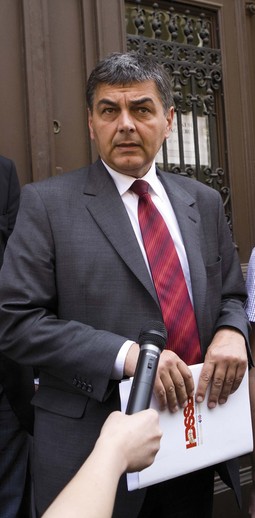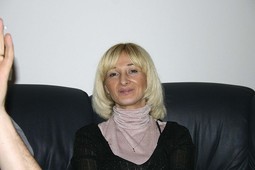The HDSSB Member of Parliament Vladimir Sisljagic with Glavas's son in front of Zagreb County CourtBefore last week's flight to Bosnia & Herzegovina, Branimir Glavas recorded a total of five video messages. Even the first provoked massive public attention in Croatia because of the never before seen attacks levelled at Croatian Prime Minister Ivo Sanader, and the rest will be available to the Croatian public soon. As Nacional has learned from sources close to Glavas, it is his intention to send a new message to the Croatian public every few days, each being very embarrassing for Sanader.
That, however, will not be the end of Glavas's public attacks: he is ready to continue dispatching stinging criticisms of the Sanader administration from his hideout in Herzegovina, and the only way for him to stop is the possibility of a secret settlement. The information that has spread among people near Glavas these past days is, namely, that the dispute could be resolved only if Sanader were to send his emissary to Herzegovina soon for direct negotiation. This is in fact blackmail on the part of Glavas whereby he will continue to attack Sanader unless an agreement is reached in the meantime. According to some sources, Glavas is offering Sanader an end to this vehement campaign if Sanader were to see to it that the Supreme Court overturn the first instance ruling in which Glavas was sentenced to ten years in prison, and would, allegedly, accept a sentence of under five years.
That is, besides, what Glavas expected from his former party colleague, but last week's decision on the part of County Court was to hand down a ten-year sentence and that is why Glavas feels that Sanader deceived him. On the other hand, Sanader has come out the biggest loser because Glavas has been laying in to him for days now, and European negotiators are not at all pleased with the entire situation, likewise the majority of the Croatian public, while the remainder is maliciously enjoying Glavas's attacks, humiliating for the Croatian Prime Minister. What happened last week was a total debacle for Sanader: for years it had been considered that it had been he who had launched the court action against Glavas and that the entire case would be wrapped up when Glavas wound up in jail to serve a long prison sentence where he would not be able to address the public. And quite the opposite happened: in spite of the verdict, Glavas is at large in Herzegovina and intends to continue being a vehement critic of Sanader and a political factor in his own right.
The events related to the verdict handed down to Glavas have these past days demonstrated all of the negative aspects of Croatian politics: shady and secretive political deals, fictitious public arguments, lies and insults, no respect for the law, attempts to affect the judiciary, shifting responsibility and a spasmodic struggle – by some to gain power, and by others to stay out of jail. In the space of a few days Sanader, Glavas and their respective associated have demonstrated an unbelievable similarity in their set of values, with only minor differences in method and style. Glavas has for years made it abundantly clear that he has no respect at all for Croatian laws and institutions, or rather that he feels that he is above them, which he most vividly demonstrated with his flight to a neighbouring country. Sanader does respect Croatian laws and institutions insofar as he would like to have them under his control, which he most vividly demonstrated with his unheard of attack on the independence of the Croatian judiciary, accusing Zagreb County Court for poor timing in handing down the verdict in the Glavas case. This similarity could also be discerned in Sanader's and Glavas's associates, who were out to outdo each other last weekend in making outrageous attacks quite unsuitable to a modern and democratic country. Vladimir Sisljagic declared "war to the last man" against Sanader and the HDZ (Croatian Democratic Union), whatever that means, to which Sanader's Deputy Prime Minister Jadranka Kosor retorted, calling Sisljagic a "Yugoslav Army officer", and that same evening the head of the central committee of Glavas's party attacked Sanader saying he had "filmed porno movies in Austria while others were dying in Croatia," and that Jadranka Kosor had "worked against Croatia in 1990, which is why she was kicked out of the Croatian Radio and Television company."
As things stand for the moment the relative winner in this showdown between the two former party colleagues is Branimir Glavas. Despite the fact that he has been, after a long and difficult trail, finally found guilty of war crimes committed in Osijek, Glavas has evaded arrest and his prison sentence, an he will by all accounts spend his life at large in Herzegovina filming video messages for the Croatian public, acting out the role of a political dissident and probably become the leader of the marginal right wing radicals Miroslav Tudjman simply lacks the charisma to lead. And while he could have spent the rest of his life in peace in the neighbouring country, everyone who knows Glavas could have assumed that this would not be the case – these past days he has been entertaining himself recording video messages for the Croatian public, and it is likely that no in Croatia would be surprised if Glavas was to opt for a quite bizarre move – to run in the coming presidential elections. And while this falls under the science fiction Gordana Getos Magdic was sentenced to seven years in prison, subject to appealcategory, from the legal point of view only victory at the presidential elections could provide him with the irrefutable immunity from legal persecution with which he could return to Croatia without fear of finding himself behind bars.
Sanader is, on the other hand, the biggest loser: Glavas and his people have been publicly insulting him for days now, his personal rating and rating within the party is falling every day, his public appearances are costing him what little credibility he still has and his nervousness and an impression that he is losing control and political power is rapidly coming to the surface. The latest blow to the Croatian Prime Minister was delivered by Supreme Court President Branko Hrvatin, who said that Sanader had crossed the line of an independent judiciary.
Four things are contentious for Croatia in the entire matter. First, that, in spite of the verdict, justice will evidently not be done. Second, that with this outcome of the Glavas case Croatia has come no closer to the European Union, and has perhaps even moved farther away, which could have direct consequences on the accession negotiations. Third, the Glavas case has demonstrated all of the regressiveness and instability of the HDZ, as many influential members of the party continue to support Glavas. The fourth element is the most devastating to Croatian politics, because it most vividly demonstrates the hypocrisy of Croatia's political players – in spite of nominal conflicts and trials, Sanader too has for years been cooperating brilliantly, and there are some indicators that this cooperation continues to this day.
Glavas's flight to Herzegovina last week meant an elegant evasion of Croatian laws and of personal and political responsibility for the former ruler of Slavonia. What is, however, disconcerting is the fact that this will cause serious difficulty for every Croatian politician who would broach the subject, say, in Brussels. And while Sanader will, for domestic political consumption, not hesitate to accuse some one else for it all, from a tactless judiciary to the SDP (Social Democratic Party), there is no doubt that over the coming months he and any other member of a Croatian negotiating team will blush in shame when asked by euro-politicians how it is possible for a convicted war criminal to avoid punishment and take all of the institutions of an allegedly well-ordered country for a ride. It was clear to everyone in Croatia throughout the entire case that the case could not, for various reasons, be the most exemplary example of the efficient judicial processing of war crimes. The flight of the principal defendant ahead of the handing down of a ten year prison sentence, that is to say the inability or carelessness of institutions to prevent him from doing so, is only the latest and most worrisome evidence that Croatia still has serious problems with the functioning of the state, which should be based on the rule of law and justice.
It is quite clear that the direct and only responsibility for Glavas's flight lies with – Croatian Parliament. And Sanader's HDZ has the majority there. The fundamental mistake, omission or approbation shown towards Branimir Glavas, should be sought in the ruling coalition's decision whereby it on 12 January 2008 did not repeal Glavas's immunity from legal prosecution, which would have made it possible for the police to detain him. Even then the Members of Parliament from the HDZ, HSS (Croatian Peasant's Party) and the HSLS (Croatian Social Liberal Party) clearly demonstrated that they did not at all find it difficult to share a bench with a man accused by the prosecution of having committed serious war crimes. From the present perspective, the MPs secured Glavas's liberty during and after the trial for at least three reasons: some to this day consider him an unquestionable hero; another group did so for reasons of unprincipled political pragmatism; and the third part did so because that was the directive from the party leadership. In any event, the decision by Croatian Parliament had far reaching consequences as it set the framework for the behaviour of all the other actors in the entire case. Last week's debates on whether the police should have prevented Glavas's flight or not, or whether the courts should have seized his passport, were, namely, quite beside the point. Neither the police nor the courts had any legal grounds to do so, and were prevented in this by – Croatian Parliament.
And while Glavas and his HDSSB (Croatian Democratic Party of Slavonia and Baranja) were nominally in conflict with Sanader and the HDZ, various events were the cause of doubts as to the true nature of their relationship. The first signs of a possible secret deal struck between these "bitter enemies" emerged back in December of 2006 when Glavas managed to get himself released from Remetinec Prison after staging a hunger strike. Even back then there had been speculation that Glavas and Sanader had struck a secret pact: if he is allowed to defend himself at liberty Glavas would in return not raise a public ruckus against Government, Sanader and the HDZ. A similar pact was probably also made ahead of the vote on Glavas's legal immunity in January of 2008: although he has for years been known for his frequent and vehement public appearances, Glavas has been significantly silent over the past two years. The entire time there had been speculation that the secret go-between for Glavas and Sanader was the HSP (Croatian Party of Rights) leader Anto Djapic, but according to some sources the "liaison officer" these past months has been Andrija Hebrang, who made it no secret in party circles that he maintained a communication with Glavas. One should also not forget former Speaker of Parliament Vladimir Seks, who for the most part remained silent from the start of the Glavas's trial, not retorting to the attacks from what was once his best friend, and as a witness in the trial gave testimony in Glavas's favour. It was Nacional in fact that in May of 2007 revealed that Seks, in spite of his proclaimed non-involvement in the entire affair was, in fact, involved in many ways: he received Andrija Getos, the father of the third defendant Gordana Getos, on several occasions, and with him sought an attorney to represent Glavas's wartime secretary.
The verdict handed down last week by Zagreb County Court also indirectly brought into question the credibility of Seks's testimony, who should have, and some say should and must have, known about Glavas's controversial activities in wartime Osijek, and perhaps bear some of the responsibility for them. Besides a nonaggression pact in exchange for defence at large, although formally on differing positions, the HDZ and Glavas's HDSSB were in Parliament – almost partners. And the votes cast by Glavas's MP's were often crucial to getting HDZ motions passed, and in March of 2008 it was the HDSSB that secured the three votes the HDZ lacked when the HSS refused to vote in favour of delaying the implementation of the protected ecological and fisheries zone for member countries of the European Union. A similar kind of "help" was provided for the HDZ by Glavas's party colleagues during the vote last year and this year on the national budget. And while these last few days everyone in the HDZ, from the president of the party The famed HDZ congress in 2002 when Glavas secured Ivo Sanader and his wing of the party victory over Ivic Pasalicto Andrije Hebrang, were surprised by the verdict condemning Glavas to ten years in prison, it is hard to believe that nobody at all noticed anything out of the ordinary in Glavas's activities over the past six months. Based on the information published to date, Glavas requested and received Bosnia & Herzegovina citizenship back in October of last year, without anyone in Croatian allegedly having a clue of what was going on. And since Glavas has been tailed and wire tapped over the past years as a result of the pressure he has put on witnesses in the trial, some of which are documented by the court, no one in Croatia our outside it will believe that this undertaking by Glavas was not noticed. Even if it was an omission or the result of carelessness, it does not in any way exculpate Croatian institutions of their guilt, because it suggests that war crimes indictees are treated in Croatia like, for example, traffic violators.
And while Glavas's rhetoric has reached a fever pitch these last days, besides harsh words and insults he has yet to state a single concrete accusation or give any concrete evidence against his former friends and party colleagues, even though some feel that he has a number of documents that compromise the entire national leadership.
What's more, in his address last weekend to his supporters in Belisce, Glavas said something that has no other use than to provide Sanader and the HDZ, i.e. the majority in Parliament, an alibi of sorts. Not long after the verdict was read last Friday there were claims that Glavas had fled to Bosnia & Herzegovina that morning or even during the actual reading of the verdict, at which he did not appear. By then the political drama had already begun, increasingly directing the public's attention to Parliament's Immunity Commission which was to take away Glavas's immunity from legal prosecution, allowing for his arrest. In his Sunday address Glavas, which is significant, for no apparent reason, said that he had fled from Croatia to Herzegovina last Tuesday, which would exculpate the inefficient Parliamentary commission because, as we can see, Glavas had already duped Croatia's institutions a few days before the verdict was handed down, and not even the speedy action of the commission would have prevented it. This statement from Glavas has not helped or hurt his current situation, but it has certainly helped the majority in Parliament. And if this fugitive continues to help the HDZ from another country and a safe hideout, it really is not at all impossible to claim that the national leadership has allowed for his scandalous flight from Croatia. And that casts a stain on the entire state apparatus and the ruling HDZ.
Glavas was ready to accept 5 years
■ According to the information available to Nacional, Branimir Glavas would not have fled to Bosnia & Herzegovina had be been convicted to a penalty under five years. It is questionable, however, what court would have handed down such a verdict for the crimes he is accused of.
The hunger strike and Djapic's chocolates
■ The entire trial of Branimir Glavas was accompanied by his, at the very least, idiosyncratic, defence strategy. As far back as in October of 2006, when the official investigation of alleged war crimes began, he undertook various activities with the aim of manipulating public perception. He staged, among other things, a hunger strike, and released a shot of himself in a hospital bed to the press, surrendered himself to the prison in Osijek wearing a general's uniform and accused Anto Djapic of having eaten the chocolates he was to have brought him in prison.







